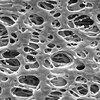(-)-Epicatechin enhances fatigue resistance and oxidative capacity in mouse muscle.
Nogueira, L; Ramirez-Sanchez, I; Perkins, GA; Murphy, A; Taub, PR; Ceballos, G; Villarreal, FJ; Hogan, MC; Malek, MH
The Journal of physiology
589
4615-31
2011
Show Abstract
The flavanol (-)-epicatechin, a component of cacao (cocoa), has been shown to have multiple health benefits in humans. Using 1-year-old male mice, we examined the effects of 15 days of (-)-epicatechin treatment and regular exercise on: (1) exercise performance, (2) muscle fatigue, (3) capillarity, and (4) mitochondrial biogenesis in mouse hindlimb and heart muscles. Twenty-five male mice (C57BL/6N) were randomized into four groups: (1) water, (2) water-exercise (W-Ex), (3) (-)-epicatechin ((-)-Epi), and (4) (-)-epicatechin-exercise ((-)-Epi-Ex). Animals received 1 mg kg(-1) of (-)-epicatechin or water (vehicle) via oral gavage (twice daily). Exercise groups underwent 15 days of treadmill exercise. Significant increases in treadmill performance (∼50%) and enhanced in situ muscle fatigue resistance (∼30%) were observed with (-)-epicatechin. Components of oxidative phosphorylation complexes, mitofilin, porin, nNOS, p-nNOS, and Tfam as well as mitochondrial volume and cristae abundance were significantly higher with (-)-epicatechin treatment for hindlimb and cardiac muscles than exercise alone. In addition, there were significant increases in skeletal muscle capillarity. The combination of (-)-epicatechin and exercise resulted in further increases in oxidative phosphorylation-complex proteins, mitofilin, porin and capillarity than (-)-epicatechin alone. These findings indicate that (-)-epicatechin alone or in combination with exercise induces an integrated response that includes structural and metabolic changes in skeletal and cardiac muscles resulting in greater endurance capacity. These results, therefore, warrant the further evaluation of the underlying mechanism of action of (-)-epicatechin and its potential clinical application as an exercise mimetic. | | 21788351
 |
Modulation of the dystrophin-associated protein complex in response to resistance training in young and older men.
Kosek, DJ; Bamman, MM
Journal of applied physiology (Bethesda, Md. : 1985)
104
1476-84
2008
Show Abstract
The dystrophin-associated protein complex (DAPC) is a scaffold of proteins linking the intracellular cytoskeleton with the extracellular matrix that is integral to structural stability and integrity, signaling and mechanotransduction, and force transmission. We hypothesized that the expression of DAPC component proteins would be altered by resistance loading during progressive resistance training (PRT)-mediated myofiber hypertrophy, and we investigated whether aging influenced these changes. Seventeen young (27 yr) and 13 older (65 yr) men completed 16 wk of PRT with muscle biopsies at baseline (T1), 24 h after bout 1 (T2), and 24 h after the final bout at week 16 (T3). Myofiber hypertrophy in the young (type I 31%, P less than 0.005; type II 40%, P less than 0.001) far exceeded hypertrophy in the old (type II only, 19.5%, P less than 0.05). PRT altered protein expression for caveolin-3 (decreased 24% by T3, P less than 0.01), alpha(1)-syntrophin (increased 16% by T3, P less than 0.05), alpha-dystrobrevin (fell 23% from T2 to T3, P less than 0.01), and dystrophin [rose acutely (30% by T2, P less than 0.05) and returned to baseline by T3]. The phosphorylation state of membrane neuronal nitric oxide synthase (Ser(1417)) decreased 70% (P less than 0.005) by T3, particularly in the old (81%), whereas p38 MAPK phosphorylation increased twofold by T3 in the old (P less than 0.01). We conclude that component proteins of the DAPC are modulated by PRT, which may serve to improve both structural and signaling functions during load-mediated myofiber hypertrophy. The blunted hypertrophic adaptation seen in old vs. young men may have resulted from overstress, as suggested by marked p38 MAPK activation in old men only. | Western Blotting | 18356484
 |
AMPK signaling in contracting human skeletal muscle: acetyl-CoA carboxylase and NO synthase phosphorylation.
Chen, Z P, et al.
Am. J. Physiol. Endocrinol. Metab., 279: E1202-6 (2000)
2000
Show Abstract
AMP-activated protein kinase (AMPK) is a metabolic stress-sensing protein kinase responsible for coordinating metabolism and energy demand. In rodents, exercise accelerates fatty acid metabolism, enhances glucose uptake, and stimulates nitric oxide (NO) production in skeletal muscle. AMPK phosphorylates and inhibits acetyl-coenzyme A (CoA) carboxylase (ACC) and enhances GLUT-4 translocation. It has been reported that human skeletal muscle malonyl-CoA levels do not change in response to exercise, suggesting that other mechanisms besides inhibition of ACC may be operating to accelerate fatty acid oxidation. Here, we show that a 30-s bicycle sprint exercise increases the activity of the human skeletal muscle AMPK-alpha1 and -alpha2 isoforms approximately two- to threefold and the phosphorylation of ACC at Ser(79) (AMPK phosphorylation site) approximately 8.5-fold. Under these conditions, there is also an approximately 5.5-fold increase in phosphorylation of neuronal NO synthase-mu (nNOSmu;) at Ser(1451). These observations support the concept that inhibition of ACC is an important component in stimulating fatty acid oxidation in response to exercise and that there is coordinated regulation of nNOSmu to protect the muscle from ischemia/metabolic stress. | | 11052978
 |


















